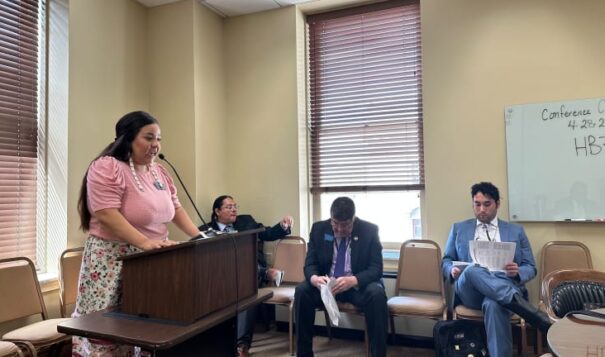News Based on facts, either observed and verified directly by the reporter, or reported and verified from knowledgeable sources.
Montana education bill resists amendments
 Sharen Kickingwoman, Blackfeet and A’anniii, representing the American Civil Liberties Union of Montana, speaks during public comment to the conference committee on April 28, 2023. (JoVonne Wagner, ICT and MTFP)
Sharen Kickingwoman, Blackfeet and A’anniii, representing the American Civil Liberties Union of Montana, speaks during public comment to the conference committee on April 28, 2023. (JoVonne Wagner, ICT and MTFP)
At one point, the Indian Education For All bill was amended to reduce the curriculum requirement from a ‘requirement’ to an ‘encouraged’ program
A legislative bill looking to hold Montana school districts accountable for implementing a unique state education requirement focused on Indigenous history, has had a wild journey.
While the bill is still alive, legislators have suggested an amendment that seemed to compromise the intent of the Indian Education for All curriculum, which is mandated by the state’s constitution. The bill’s sponsor, at one point, asked the Legislature for a ‘do-not-concur’ on an amendment that would have removed the verb “require’ to “encourage’ in the bill title.
However, following a conference committee action on April 28, the bill is now moving forward in its original form.
House Bill 338, as sponsored by Rep. Jonathan Windy Boy, Democrat, was intended to hold school districts accountable to ensure they spend Indian Education for All money appropriately to implement the curriculum.
Indian Education for All, for the state to incorporate the state’s Indigenous history and culture into public school curriculum, even though Montanas Indian Education for All program was passed in 1999.
However, earlier in April, Sen. Shannon O’Brien, Democrat, suggested an amendment that changed language in Windy Boy’s bill making the Indian education curriculum from a ‘requirement’ to an ‘encouragement,’ which was approved in the Senate Education and Cultural Resources committee.
O’Brien said she offered the amendment to help it move forward through the committee process.
“I wanted to ensure that the bill would pass out with the committee,” O’Brien said in an interview with MTFP and ICT earlier in April. “I had reason to believe that it was not going to pass out of committee without the amendment, and it worked.”
As a result, Windy Boy asked for the House floor to pass a do-not-concur motion which passed with a vote 75-25. This launched the bill into the conference committee in which six selected lawmakers met to rework the amendments.
The committee opted for another amendment to the bill, changing the wording back to its original version, Indian Education for All would be considered a requirement, again.
The IEFA bill now has the original language back with an added amendment in which the applicability of the budget report begins after July 1, 2023, an effort that Windy Boy said will allow the OPI and BPE to prepare for the curriculum adjustment change.
Sharen Kickingwoman, who is Blackfeet and represents the American Civil Liberties Union of Montana, was in attendance during the conference committee and spoke in support of the new amendment.
“Funds for this mandate should go directly to the instruction and education of our students,” she said during the committee hearing. “This means curriculum development for an American Indian Studies program, any related materials for that program, and providing training for teachers around said curriculum and program.”
Kickingwoman said all Indian education dollars should remain to be used for books, field trips and curriculum materials.
“For fulfilling that constitutional promise,” she said. ”That benefit our students’ future and education in line with the auditing that schools already undertake.”
Before the committee voted on the new amendment, O’Brien, spoke on the bill as a whole.
“I just wanna say since I did present the original amendment that’s at issue here that I think that this program, that Indian Education for all is amazing,” said the senator. “We need to keep it and we need to elevate it and our students and our communities deserve to know the history, and our tribal nations deserve to have their stories included and their voices heard in our classrooms.”
The bill, since it was amended again, now goes back where it will need to be reheard and voted on in both senate and house chambers.
This story is co-published by Montana Free Press and ICT, a news partnership that covers the Montana American Indian Caucus during the state’s 2023 legislative session. Funding is provided in part by the Headwaters Foundation.
Dateline:
HELENA, Mont.
